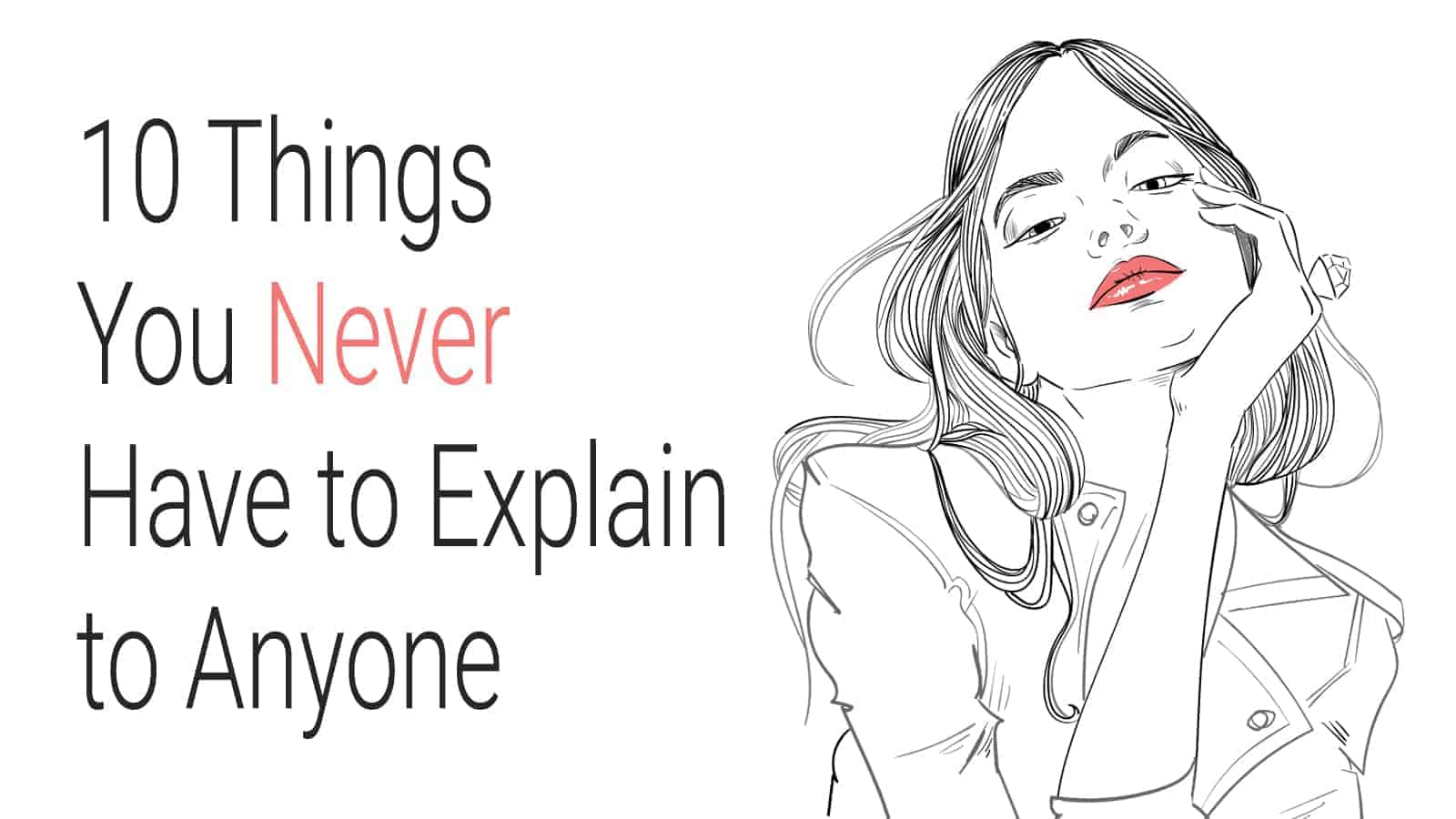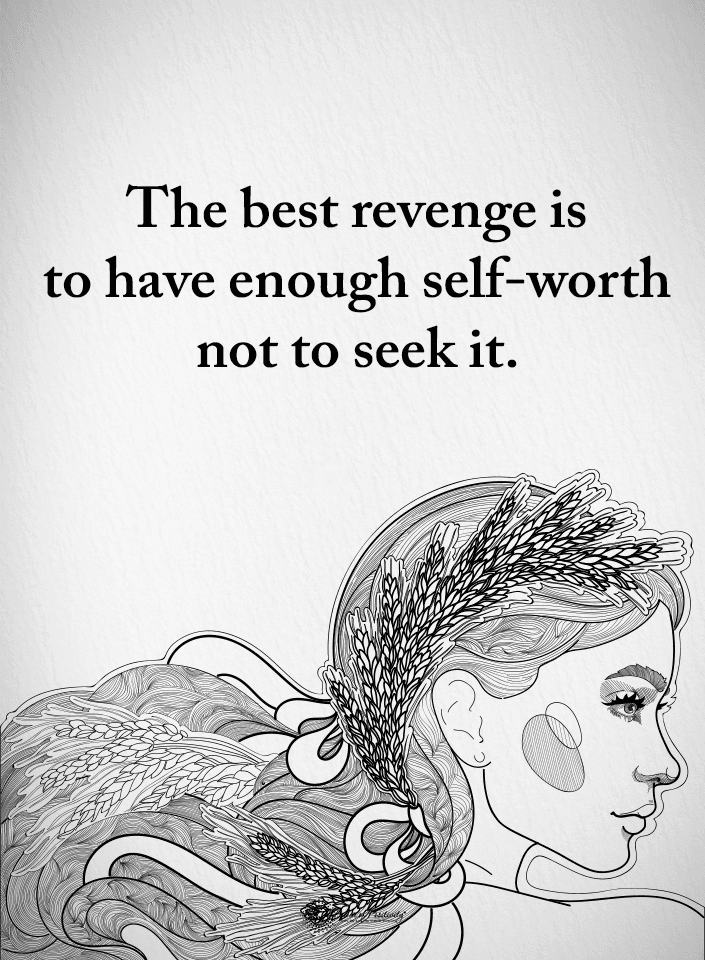In today’s world, it can be hard not to seek validation from others. For starters, social media has increased societal expectations. Additionally, all sorts of other factors can lead you to try desperately to explain certain aspects of your life and yourself to other people.
But here’s the truth: in most cases, you don’t have to explain everything, and you certainly don’t owe anybody a justification. By trying to provide that, you can be diminishing your own self-worth and defining yourself by what others think, instead of trusting yourself.
Here Are 10 Things You Never Have To Explain To Anyone
1. You Don’t Need to Explain Why You Need Alone Time
Everyone needs a little time alone. There’s absolutely no shame in having to explain that this weekend is just for you to spend in your home instead of going out with friends. You might want to read a book or watch a series or just curl up in bed. This doesn’t make you anti-social; it makes you smart and aware of your needs.
Once in a while, spending time alone is very good for you. Numerous studies indicate the value of taking time to just be with yourself. It can give you tons of benefits. For instance, you:
- Become more creative
- Get more done and are productive in a more positive way (1)
- Have the chance to do things you’ve really wanted to do
- Can get to know yourself more
- Build up happiness and positive thinking levels
- Become more empathetic
- Think more clearly and relieve stress
- Enjoy yourself
2. The Company You Keep
People are always a little nosy about who you spend your time with, especially if romance and intimacy are involved – but for everything else, too. Here are some things regarding the people you surround yourself with that you don’t have to explain.
a) Your Choice Of Partner
Your family may not approve of your significant other. Perhaps your friends will never understand what you see in your partner. Even your community may be bigoted and dislike your preferences.
Ultimately, only you should get to decide what kind of relationship you want to be in, and with who. This doesn’t mean ignoring abusive behavior. It means taking a stand for the person you have feelings for.
b) Your Friends
This doesn’t mean you should be blind to the possibility of being involved with the wrong crowd. It just means that you should be allowed to choose your companions. If your friends make you feel good, there’s no issue! At the same time, if you choose to end your relationship with a friend, you don’t have to explain that to anyone.
c) Family Members You’re In Touch With
Not everyone’s family life is great. You may have your reasons for cutting certain toxic family members off. People will try to tell you that you’ll regret those decisions, but trust yourself to know what’s best for you.
d) Your Lovers
People are always interested in what goes on in the bedroom. Men are judged for not having enough lovers. Women are judged for having too many. You may be judged for one-night stands, or friends with benefits, or because you have certain preferences.
At the end of the day, as long as what you’re doing happens between two (or more!) consenting adults, it’s all good. It’s no one’s business but yours.
e) Being Single
People often make being single sound like the worst thing ever when it’s really, really not. Just got out of a bad breakup? Need some time to figure things out? Just not interested? Very picky? Whatever applies to you, it’s all fine. You’re not worthless because you’re not in a relationship. And you don’t need to explain yourself for it either.
3. Your Favorite Things
If you’ve been on the Internet at all, you’ll be aware of a phenomenon known as “cringe culture.” This essentially refers to the active shaming and mocking of people who enjoy certain things that have been deemed “uncool” or “lame” by other Internet-users.
There’s also a lot of talk about how problematic some movies, books, celebrities, and other things can be. If you say you like them, all of a sudden, you’re a bad person, and people get angry at you about it.
But guess what? It’s okay to like what you like. It’s okay to like things that other people cringe at. You have the choice to be aware that something is problematic and still enjoy it. It’s all okay! Enjoy what you enjoy, and don’t bother telling anyone why.
4. Your Career
Some jobs are unconventional. Some are ones you hate, but that pay well. Certain vocations are practical but boring. Some ignite a passionate spark within you but cause you to barely scrape by each month.
Sometimes, you stick with jobs that aren’t the best because you like the environment. At times, you quit well-paying jobs because you’re sick of them. Sometimes, you turn down promotions that would take away time from your family. This is all completely fine.
Your career influences your life and no one else’s (except those dependent on or partnered with you). As such, you have the power to decide where you want it to go, and no one can take that away from you.
5. Your Beliefs
Differences in beliefs and values can cause a lot of tension, especially in today’s politically tense world. But here’s the thing – the chances of anyone changing someone’s mind about their personal beliefs are slim, so why waste time attempting to explain yourself if you don’t want to?
Here are some areas of personal beliefs that you never have to explain to anyone:
- Religion
- Spirituality
- Principles
- Priorities
- Ethical beliefs
- Moral values
- Political leanings
Nothing is perfect. Every belief has enough negative sides for someone to dislike it. But as long as you’re happy with the positives and know what works best for you, you owe no one any explanation – ever. If someone is going to discriminate against you as a result, then find like-minded people to converse with instead.
6. Refusing Or Agreeing To Apologize (And Forgive)
Why would you say you’re sorry when you’re not? It gives the other person incorrect expectations, and it’s a lie. You are never under any form of obligation to tell someone you’re sorry, even if it makes you look bad. Similarly, you can choose to apologize because it’s the right thing to do, even if you don’t totally mean it. It’s your decision.
The same goes for forgiveness. There’s a mentality that dictates that, even when someone has wronged you, you have to forgive them. You don’t. You can learn to move on without ever forgiving them. At the same time, if you choose to forgive, it’s no one’s business but your own.
7. You Shouldn’t Have to Explain Your Identity
Do people call you weird? Do they say you’re annoying? Or maybe they tell you to tone something down? Well, you don’t have to. Constructive criticism is good, but you have to be able to filter out the bad ones from the good.
Self-improvement is something you should always strive towards, but never feel the need to justify the person that you are. Who you are is beautiful, unique, and special. No one has the right to cause you to feel inferior.
Everyone is different. Don’t be afraid to express your own differences!
8. Being “Slower” Than Other People
Your classmate from high school is now married with kids. You have a college friend who is now working a high-paying job. Your younger siblings are graduating before you. These types of scenarios can lead to a lot of judgment from others.
But life isn’t a race. Progress isn’t a competition. Plus, everyone deals with their own struggles. You’re not in any rush to achieve the standard everyone expects of you, and that’s okay!
Continue to work towards your goals at your own pace, arming yourself with positive thinking and determination. Eventually, one day, you’ll get to where you want to be – and that place doesn’t even have to be where other people are going. It’s all up to you.
9. Even If You Did Explain Your Pain, Would People Truly Understand If They’ve Never Been Through It?
People often engage in misery competitions. How many times have you heard that you should just use positive thinking because other people have it worse? How many times have your complaints about exhaustion been scoffed at because someone got less sleep than you?
Your pain is valid. Whether it is worse or better than the pain of others is completely subjective – and, more importantly, it doesn’t matter. Other people’s issues don’t cancel out your own. In fact, this type of denial is extremely bad for you and can severely damage your mental health.
You need to learn to confront pain of all kinds in a positive way. Ignoring it will not make it go away. By facing the pain, processing it, and acknowledging it, you help yourself move on from the suffering. You do not need the validation of others for your pain to be valid. It is always valid.
10. How Much You Know You’re Worth
There’s a huge difference between being confident and being arrogant. You can value yourself and know your worth without being cocky and delusional. No matter your identity and who you are, your worth should never be called into question. This is one of those things you never have to explain.
This can mean sometimes putting yourself first – if not most of the time! Doing so has a lot of positive effects on us, and it’s a great thing to get used to doing. And no, it does not make you selfish! Here’s why: (3)
- You get a good recharge – thus reducing symptoms and risks of depression, anxiety, stress, and other issues.
- It saves you from the mentality that forces repeated productivity, eventually leading to burnout.
- It prevents negativity and overly critical thought regarding yourself and others.
- Taking time to put yourself first helps you make sure you have enough of yourself to keep and thrive, while still providing more to give if you choose.
- It stops you from draining others or hurting those around you.
- It allows you to be gentle and kind to yourself.
Final Thoughts On Some Things You Never Have To Explain To Anyone
It would be lovely if everyone you cared about or knew wholeheartedly supported every inch of your life. But that isn’t how things work. People are going to disagree with you, and they may demand explanations.
Remember that you do not need anyone’s validation. Your worth is enough as it is. If you find yourself being questioned about these 10 things you never have to explain to anyone, then you know you’re not obligated to justify yourself. Just live your life and chase your own idea of happiness!






















